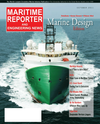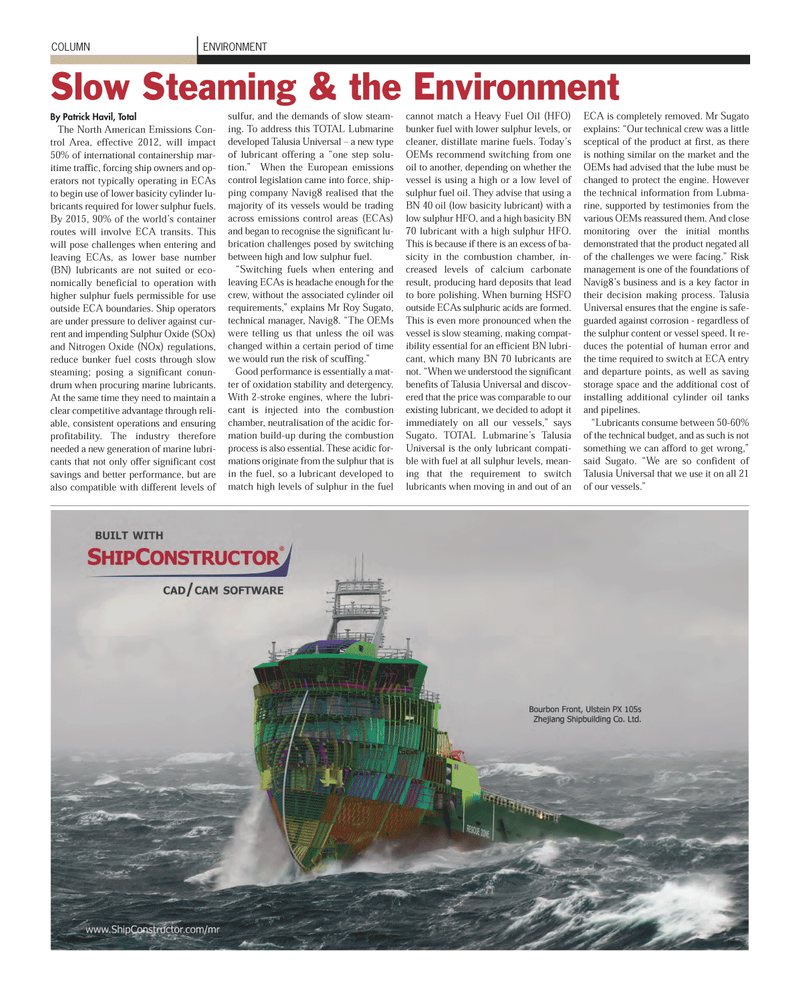
Page 24: of Maritime Reporter Magazine (October 2011)
Marine Design Annual
Read this page in Pdf, Flash or Html5 edition of October 2011 Maritime Reporter Magazine
By Patrick Havil, Total The North American Emissions Con- trol Area, effective 2012, will impact 50% of international containership mar- itime traffic, forcing ship owners and op- erators not typically operating in ECAsto begin use of lower basicity cylinder lu- bricants required for lower sulphur fuels. By 2015, 90% of the world?s container routes will involve ECA transits. This will pose challenges when entering andleaving ECAs, as lower base number (BN) lubricants are not suited or eco-nomically beneficial to operation with higher sulphur fuels permissible for useoutside ECA boundaries. Ship operatorsare under pressure to deliver against cur- rent and impending Sulphur Oxide (SOx)and Nitrogen Oxide (NOx) regulations, reduce bunker fuel costs through slow steaming; posing a significant conun- drum when procuring marine lubricants.At the same time they need to maintain a clear competitive advantage through reli- able, consistent operations and ensuringprofitability. The industry therefore needed a new generation of marine lubri- cants that not only offer significant cost savings and better performance, but are also compatible with different levels of sulfur, and the demands of slow steam- ing. To address this TOTAL Lubmarine developed Talusia Universal ? a new type of lubricant offering a ?one step solu- tion.? When the European emissions control legislation came into force, ship- ping company Navig8 realised that the majority of its vessels would be trading across emissions control areas (ECAs)and began to recognise the significant lu- brication challenges posed by switchingbetween high and low sulphur fuel. ?Switching fuels when entering andleaving ECAs is headache enough for the crew, without the associated cylinder oil requirements,? explains Mr Roy Sugato, technical manager, Navig8. ?The OEMs were telling us that unless the oil was changed within a certain period of timewe would run the risk of scuffing.? Good performance is essentially a mat-ter of oxidation stability and detergency. With 2-stroke engines, where the lubri- cant is injected into the combustion chamber, neutralisation of the acidic for- mation build-up during the combustion process is also essential. These acidic for- mations originate from the sulphur that isin the fuel, so a lubricant developed to match high levels of sulphur in the fuel cannot match a Heavy Fuel Oil (HFO) bunker fuel with lower sulphur levels, or cleaner, distillate marine fuels. Today?s OEMs recommend switching from oneoil to another, depending on whether the vessel is using a high or a low level of sulphur fuel oil. They advise that using a BN 40 oil (low basicity lubricant) with a low sulphur HFO, and a high basicity BN 70 lubricant with a high sulphur HFO.This is because if there is an excess of ba- sicity in the combustion chamber, in- creased levels of calcium carbonate result, producing hard deposits that leadto bore polishing. When burning HSFO outside ECAs sulphuric acids are formed.This is even more pronounced when the vessel is slow steaming, making compat- ibility essential for an efficient BN lubri- cant, which many BN 70 lubricants are not. ?When we understood the significant benefits of Talusia Universal and discov- ered that the price was comparable to our existing lubricant, we decided to adopt it immediately on all our vessels,? says Sugato. TOTAL Lubmarine?s Talusia Universal is the only lubricant compati- ble with fuel at all sulphur levels, mean- ing that the requirement to switchlubricants when moving in and out of an ECA is completely removed. Mr Sugato explains: ?Our technical crew was a little sceptical of the product at first, as there is nothing similar on the market and the OEMs had advised that the lube must bechanged to protect the engine. However the technical information from Lubma-rine, supported by testimonies from thevarious OEMs reassured them. And close monitoring over the initial months demonstrated that the product negated all of the challenges we were facing.? Risk management is one of the foundations ofNavig8?s business and is a key factor in their decision making process. Talusia Universal ensures that the engine is safe- guarded against corrosion - regardless of the sulphur content or vessel speed. It re- duces the potential of human error andthe time required to switch at ECA entryand departure points, as well as saving storage space and the additional cost ofinstalling additional cylinder oil tanks and pipelines. ?Lubricants consume between 50-60%of the technical budget, and as such is not something we can afford to get wrong,? said Sugato. ?We are so confident of Talusia Universal that we use it on all 21 of our vessels.? ENVIRONMENTCOLUMNSlow Steaming & the Environment MR Oct.11 # 3 (18-24):MR Template 10/5/2011 12:41 PM Page 24

 23
23

 25
25
